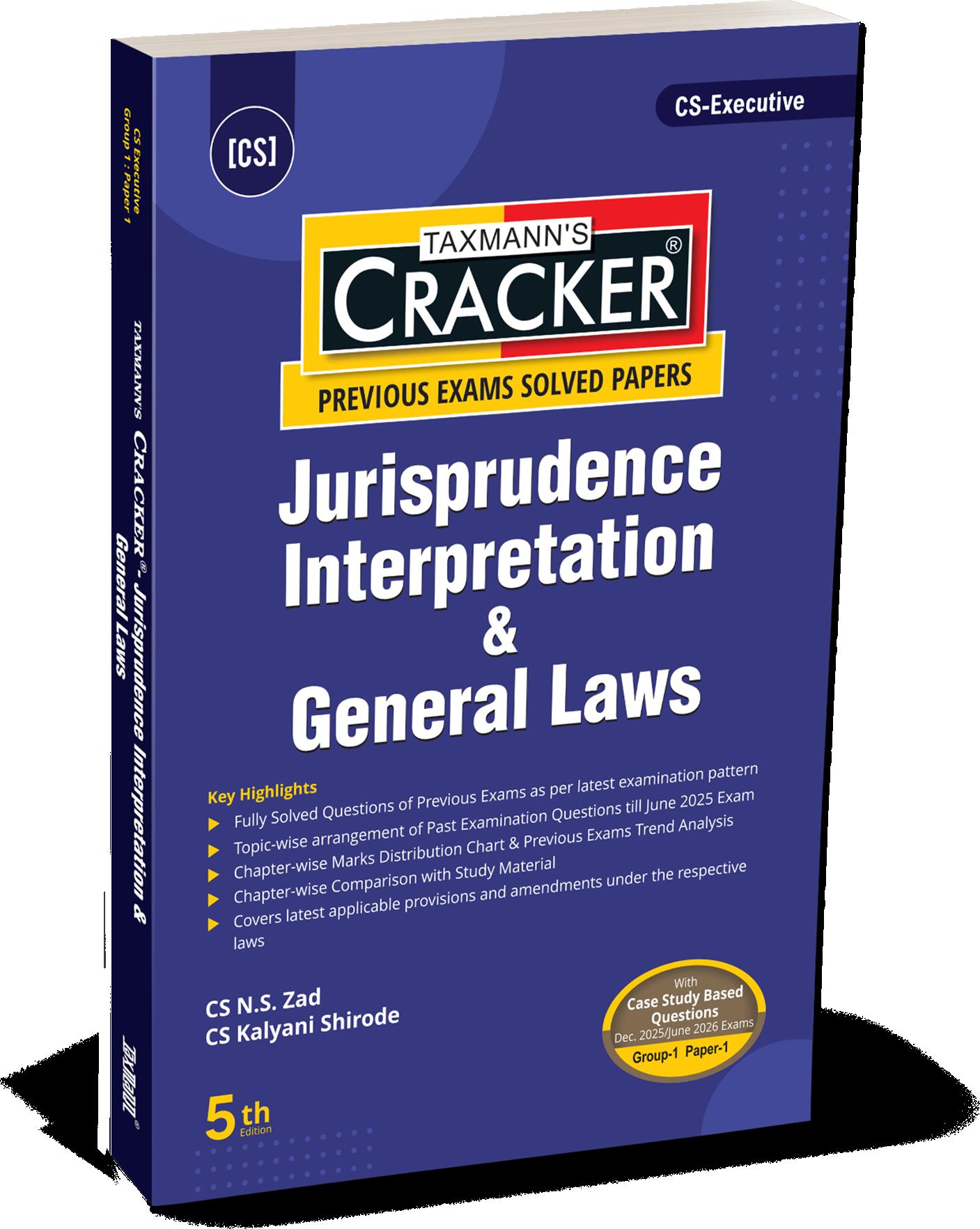LAW RELATING TO CRIME AND ITS PROCEDURE
STAGES OF CRIME & PUNISHMENTS
1. Distinguish between: Crime & Civil Wrong
Ans.: Following are the main points of distinction between Crime & Civil Wrong:
Points Crime Civil Wrong
Meaning Crime means any act or omission made punishable under any law. Wrongs that affect the interests of a particular individual are called civil wrong.
Wrong Crime is a wrong against society. Civil wrong is against a private individual or individuals.
Seriousness More serious wrongs have been considered to be public wrongs and are known as crimes.
Less serious wrongs are considered as private wrongs and have been labelled as civil wrong.
Intention In crime intention is essential element. In civil wrong intention is not relevant.
Action In case of crime action is taken by the State i.e. Government.
Compromise In case of crime compromise is not possible except in certain cases.
In case of civil wrong the suit is filed by the aggrieved person himself.
In case of civil suit, compromise is always possible.
Penalty Wrongdoer is punished. Wrongdoer pays compensation or damages to the injured party.
2. Discuss in detail various stages of crime.
Ans.: In every crime, there is first intention to commit it, secondly, preparation to commit it, thirdly, attempt to commit it and fourthly the accomplishment. The stages can be explained as under –
7.2
LAW RELATING TO CRIME AND ITS PROCEDURE
(1) Intention: This is the first stage in commission of a crime. The law does not take notice of an intention, mere intention to commit an offence not followed by any act, cannot constitute an offence. The obvious reason for not prosecuting the accused at this stage is that it is very difficult for the prosecution to prove the guilty mind of a person. This stage is a significant progress from mere deliberation towards actual commission of the crime. At this stage, the person has made up his mind to actually implement or execute his devious plans. There is an intention to cause harm but yet no action taken that manifests intention. Further, there is no way to prove an intention because even devil can’t read a human mind. Thus, this is not considered a crime. For example, intention to kill anyone is not a crime in itself. However, it is an essential ingredient of crime because without intention to cause harm, there can be no crime.
(2) Preparation: Preparation is the second stage in the commission of a crime. It means to arrange the necessary measures for the commission of the intended criminal act. Intention alone or the intention followed by a preparation is not enough to constitute the crime. Preparation has not been made punishable because in most of the cases the prosecution has failed to prove that the preparations in the question were made for the commission of the particular crime.
Example: If Arun purchases a pistol and keeps the same in his pocket duly loaded in order to kill his bitter enemy Ballu, but does nothing more. Arun has not committed any offence as still he is at the stage of preparation and it will be impossible for the prosecution to prove that Arun was carrying the loaded pistol only for the purpose of killing Ballu.
(3) Attempt: Attempt, which is the third stage in the commission of a crime, is punishable. Attempt is the direct movement towards the commission of a crime after the preparation is made. A person may be guilty of an attempt to commit an offence if he does an act which is more than merely preparatory to the commission of the offence and a person will be guilty of attempting to commit an offence even though the facts are such that the commission of the offence is impossible.
(4) Accomplishment/Completion: Last stage in the commission of an offence is its accomplishment or completion. If the accused succeeds in his attempt to commit the crime, he will be guilty of the complete offence and if his attempt is unsuccessful he will be guilty of an attempt only. For example, A fires at B with the intention to kill him, if B dies, A will be guilty for committing the offence of murder and if B is only injured, it will be a case of attempt to murder.
3. In exceptional cases, mere ‘preparation’ to commit an offence is punishable under Bharatiya Nyaya Sanhita, 2023. Discuss. [Dec. 2018 (4 Marks)]
Ans.: Preparation is the second stage in the commission of a crime. It means to arrange the necessary measures for the commission of the intended criminal act. Intention alone or the intention followed by a preparation is not enough to constitute the crime. Preparation has not been made punishable because in most of the cases the prosecution has failed to prove that the preparations in the question were made for the commission of the particular crime.
Example: If Arun purchases a pistol and keeps the same in his pocket duly loaded in order to kill his bitter enemy Ballu, but does nothing more. Arun has not committed any offence as still he is at the stage of preparation and it will be impossible for the prosecution to prove that Arun was carrying the loaded pistol only for the purpose of killing Ballu.
Generally, preparation to commit any offence is not punishable but in some exceptional cases preparation is punishable, following are some examples of such exceptional circumstances which are punishable under the BNS –
(
(
a) Preparation to wage war against the Government.
b) Preparation to commit depredation on territories of a power at peace with Government of India.
(
c) Preparation to commit dacoity.
(d) Preparation for counterfeiting of coins or Government stamps.
(
e) Possessing counterfeit coins, false weights or measurements and forged documents.
4. Distinguish between: Motive & Intention
Ans.: Following are the main points of distinction between Motive & Intention:
Points
Meaning
Nature
Criminal liability
Motive Intention
Motive refers to the reason a crime was committed. It is often the background of the suspect in committing the alleged crime.
Motive is the reason that drives a person to do an act or refrain from acting in a specific manner.
Motive is insubstantial to determine criminal liability.
Purpose Motive is hidden or implied purpose.
What is it?
Intention mean doing any act with one’s will or desire for some purpose.
Intention of a person can be determined by the use of particular means and the circumstances that resulted in the criminal offence.
Intention is substantial to determine criminal liability.
Intention is the expressly defined purpose of the crime
Motive is driving force of crime. Intention is first stage of crime.
7.4
LAW RELATING TO CRIME AND ITS PROCEDURE
Points Motive Intention
Example
Assume that Y is accused of murdering his wife and it turns out that his wife has a policy of ` 1 Crore that will come to Y after the death of his wife. The law will assume that the ` 1 Crore is a profit that Y will gain by his wife’s death and so prosecution will try to establish that since Y’s wife death is a profit to him of ` 1 Crore, Y have motive. Thus, Y has a reason to commit the crime.
Assume that X is caught with 2 kilos of heroin in his house. A rational man will assume that X cannot be keeping the heroin at home for private consumption, so the normal assumption will be that X mean to sell this heroin (i.e. distribute). So X will be charged with possession with intent to distribute. This means the law can assume what your intentions are with respect to a criminal offence.
5. Briefly discuss various types of punishments provided under the Bharatiya Nyaya Sanhita, 2023.
Ans.: The punishments to which offenders are liable under the provisions of this Sanhita are—
(a) Death;
(b) Imprisonment for life, that is to say, imprisonment for remainder of a person’s natural life;
(
c) Imprisonment, which is of two descriptions, namely:
(1) Rigorous, that is, with hard labour.
(2) Simple.
(d) Forfeiture of property;
(
e) Fine;
(
f) Community Service.
6. Distinguish between: Fine & Penalty
Ans.: Following are main points of difference between fine & penalty:
Meaning Fine is a sum imposed as punishment for an offense.
Penalty is the suffering or the sum to be forfeited to which a person agrees to be subjected in case of non-fulfilment of stipulations.
Base Fines are against offences. Penalties are against noncompliances.
Example According to Section 16(3) of the Companies Act, 2013, if a company makes default in complying with any direction given under section
According to Section 12( 8 ) of the Companies Act, 2013, if any default is made in complying with the requirements of Section 12,
Points Fine Penalty
16( 1 ), the company shall be punishable with fine of ` 1,000 for every day during which the default continues and every officer who is in default shall be punishable with fine which shall not be less than ` 5,000 but which may extend to ` 1 lakh.
Here the default is in nature of offence and the provision provides for fine as a punishment.
ESSENTIAL ELEMENTS CRIME
the company and every officer who is in default shall be liable to a penalty of ` 1,000 for every day during which the default continues but not exceeding ` 1 lakh.
Here the default is in nature of non-compliance and hence the provision creates the liability of penalty.
7. State the fundamental elements of a crime.
Ans.: There are four elements which constitute a crime, these are as follows:
(1) Human Being: The first element requires that the wrongful act must be committed by a human being. In ancient times, when criminal law was largely dominated by the idea of retribution, punishments were inflicted on animals also for the injury caused by them, for example, a pig was burnt in Paris for having devoured a child, a horse was killed for having kicked a man. But now, if an animal causes an injury we hold not the animal liable but its owner liable for such injury. So the first element of crime is a human being who must be under the legal obligation to act in a particular manner and should be a fit subject for awarding appropriate punishment.
(2) Mens Rea: There can be no crime of any nature without mens rea or an evil mind. Every crime requires a mental element and that is considered as the fundamental principle of criminal liability. The basic requirement of the principle mens rea is that the accused must have been aware of those elements in his act which make the crime with which he is charged. There is a well known maxim in this regard, i.e. “actus non facit reum nisi mens sit rea” which means that, the guilty intention and guilty act together constitute a crime.
(3) Actus Reus: The third essential element of a crime is actus reus. In other words, some overt act or illegal omission must take place in pursuance of the guilty intention. Actus reus is the manifestation of mens rea in the external world.
(4) Injury: The fourth requirement of a crime is injury to another person or to the society at large. The injury should be illegally caused to any person in body, mind, reputation or property. According to Section 44 the injury denotes any harm whatever illegally caused to any person in body, mind, reputation or property.
LAW RELATING TO CRIME AND ITS PROCEDURE
8. Distinguish between: Mens Rea & Actus Reus
Ans.: Following are the main points of distinction between mens rea & actus reus:
Points Mens Rea Actus Reus
Meaning Mens rea means bad intention of the person committing crime.
What it is?
Element of crime
Mens rea is the intent a person has behind committing a crime.
Mens rea is the second important essential element of a crime.
Aspect Mens Rea refers to the mental aspect of crime.
Actus reus is some overt act or illegal omission must take place in pursuance of the guilty intention.
Actus reus is the action the person takes to perform the criminal act.
Actus reus is the third important essential element of a crime.
Actus Reus refers to the physical aspect of a crime.
9. Discuss the important forms of ‘mens rea’ under the Bharatiya Nyaya Sanhita, 2023. [June 2021 (4 Marks)]
Ans.: One of the essential elements of a crime is mens rea or evil intent or guilty mind. There can be no crime of any nature without mens rea. The basic requirement of the principle mens rea is that no person can be punished in a proceeding of criminal nature unless it can be showed that he had a guilty mind.
Forms of mens rea: Intention, Negligence and Recklessness are the important forms of mens rea.
(1) Intention: Intention is defined as – ‘the purpose or design with which an act is done’. Intention indicates the position of mind, condition of someone at particular time of commission of offence and also will of the accused to see effects of his unlawful conduct. Criminal intention does not mean only the specific intention but it includes the generic intention as well.
Example: Anil poisons the food which Barun was supposed to eat with the intention of killing Barun. Chandan eats that food instead of Barun and is killed. Anil is liable for killing Chandan although Anil never intended it.
(2) Negligence: Negligence is the second form of mens rea. Negligence is not taking care, where there is a duty to take care. Negligence or carelessness indicates a state of mind where there is absence of a desire to cause a particular consequence. The standard of care established by law is that of a reasonable man in identical circumstances. What amounts to reasonable care differs from thing to thing depending situation of each case. In criminal law, the negligent conduct amounts to mens rea.
Example: If a child is injured because his or her caretaker failed to perform her duties, she may be guilty of criminal negligence.
(3) Recklessness: Recklessness is the decision to commit a certain action despite knowing about associated risks.
Example: If a person causes injury while driving drunk, he can be found guilty of recklessly causing harm. He did not intend to hurt anyone, and did not expect it to happen, but he knew he was taking the risk of hurting someone by driving the car after drinking.
10. State the exceptional cases where mens rea is not required in criminal law.
There are exceptional circumstances under which mens rea is not required in criminal law. Discuss. [Dec. 2023 (4 Marks)]
Ans.: There are many exceptional cases where mens rea is not required in criminal law. Some of them are as follows:
(
a) Statute excludes mens rea: Where a statute imposes liability, the presence or absence of a guilty mind is irrelevant. The classical view of that ‘ no mens rea, no crime’ has long been eroded and several laws in India and abroad, especially regarding economic crimes and departmental penalties, have created severe punishment even where the offences have been defined to exclude mens rea. Many laws passed in the interest of public safety and social welfare imposes absolute liability. There is absolute liability (mens rea is not essential) in the licensing of shops, hotels, restaurants and chemists establishments. The same is true of cases under the Motor Vehicles Act and the Arms Act, offences against the State like waging of war, sedition etc.
(
b) Speedy disposal of case: Where it is difficult to prove mens rea and penalties are petty fines. In such petty cases, speedy disposal of cases is necessary and the proving of mens rea is not easy. An accused may be fined even without any proof of mens rea.
(
c) Strict liability: In the interest of public safety, strict liability is imposed and whether a person causes public nuisance with a guilty mind or without guilty mind, he is punished.
(
d) Ignorance of the law: If a person violates a law even without the knowledge of the existence of the law, it can still be said that he has committed an act which is prohibited by law. In such cases, the fact that he was not aware of the law and hence did not intend to violate it is no defense and he would be liable as if he was aware of the law. This follows from the maxim ‘ignorance of the law is no excuse’.
LAW RELATING TO CRIME AND ITS PROCEDURE
11. Companies can no longer claim immunity from criminal liability on the ground that they are incapable of possessing the necessary mens rea for commission of offences. Critically examine. [June 2022 (4 Marks)]
Ans.:
Criminal liability presupposes the existence of mens rea (guilty mind) and actus reus (guilty act) – the two essential ingredients of an offence under the BNS.
Natural persons can be convicted of an offence as they possess mind. However, when an offence has been committed by a company (legal person), the question arises as to whether the company can be convicted of a criminal offence.
According to Section 2(26) of the BNS, the word ‘person’ includes any Company or Association, or body of persons, whether incorporated or not. Thus, companies are covered under the provisions of the BNS.
Virtually in all jurisdictions across the world governed by the rule of law, companies can no longer claim immunity from criminal prosecution on the ground that they are incapable of possessing the necessary mens rea for the commission of criminal offences. The criminal intent of the ‘alter ego’ of the company/body corporate i.e. the person or group of persons that guide the business of the company, is imputed to the company.
In State of Maharashtra v. M/s Syndicate Transport, it was held that the question whether a corporate body should or should not be liable for criminal action resulting from the acts of some individual must depend on the nature of offence disclosed by the allegations in the complaint or in the charge sheet, the relative position of the officer or agent vis-à-vis the corporate body and other relevant facts and circumstances which could show that the corporate body, as such, meant or intended to commit that act.
In the case of corporate criminal liability, the settled position of law is now that a company is virtually in the same position as any individual and may be convicted of offences including those requiring mens rea Furthermore, a company cannot escape liability for a criminal offence merely because the punishment prescribed is that of “imprisonment and a fine”.
A corporation did not have a physical body to imprison and therefore could not be sentenced to imprisonment but it could be fined for offence as provided in law.
OFFENCES UNDER BHARATIYA NAGARIK SURAKSHA SANHITA, 2023
12. Distinguish between: Bailable offence & non-bailable offence [June 2011 (4 Marks)]
Ans.: Following are the main points of difference between bailable & nonbailable offence:
Points
Bailable Offence
Meaning A bailable offence is an offence which is shown as bailable in First Schedule to the Sanhita or which is made bailable by any other law.
Example The First Schedule to the Bharatiya Nagarik Suraksha Sanhita, 2023 gives a list of bailable offense, as for instance:
- Rioting,
- Being a member of an unlawful assembly, - Bribery.
Seriousness
Cognizable/ NonCognizable
Non-bailable Offence
A non-bailable offence means offence other than bailable offence.
The examples of non-bailable offences are:
- Murder,
- Culpable homicide,
- Counter feting coins etc.
Bailable offences are less serious. Non-bailable offences are more serious.
Bailable offences are generally non-cognizable.
BNS If an offence which is punishable with imprisonment for less than 3 years or with fine only, it is bailable.
Arrest Police officer is authorized to arrest with warrant
Non-bailable offences are generally cognizable.
A Non-Bailable offence is one which is punishable with a death penalty or life imprisonment for 3 years or more
Police officer is authorized arrest without warrant
13. Distinguish between: Cognizable Offence & Non-Cognizable Offence [Dec. 2014 (4 Marks)], [June 2019 (4 Marks)]
Ans.: Following are the main points of difference between cognizable & noncognizable offences:
Points Non-cognizable offence
Meaning Non-cognizable offence means an offence for which a police officer can make arrest with warrant.
Cognizable/ Non-Cognizable
Non-cognizable offences are generally bailable
Cognizable offence
Cognizable offence means an offence for which a police officer may arrest without warrant.
Cognizable offences are generally non-bailable
7.10
LAW RELATING TO CRIME AND ITS PROCEDURE
Points Non-cognizable offence
Seriousness Non-cognizable offences are less serious.
Arrest by Police Officer
Police officer is authorized to arrest with warrant
Example Intentional insult, voluntarily causing hurt, assault, cheating, forgery, etc.
POWER OF COURTS TO PASS SENTENCE
Cognizable offence
Cognizable offences are more serious.
Police officer is authorized arrest without warrant
Rioting, murder, voluntarily causing grievous hurt, etc.
14. Discuss the powers of various courts under the Bharatiya Nagarik Suraksha Sanhita, 2023. [Dec. 2009 (5 Marks)] Or
Discuss the sentences which can be passed by various courts under sections 28 and 29 of the Bharatiya Nagarik Suraksha Sanhita, 2023. [Dec. 2023 (4 Marks)]
Ans.: Following are the powers of Court to pass sentence:
(1) Sentences which High Courts and Sessions Judges may pass (Section 22)
(i) A High Court may pass any sentence authorised by law.
(ii) A Sessions Judge or Additional Sessions Judge may pass any sentence authorised by law; but any sentence of death passed by any such Judge shall be subject to confirmation by the High Court.
(2) Sentences which Magistrates may pass (Section 23)
(i) The Court of a Chief Judicial Magistrate may pass any sentence authorised by law except a sentence of death or of imprisonment for life or imprisonment for a term exceeding 7 years.
(ii) The Court of a Magistrate of the first class may pass a sentence of imprisonment for a term not exceeding three years, or of fine not exceeding fifty thousand rupees, or of both, or of community service.
(iii) The Court of Magistrate of the second class may pass a sentence of imprisonment for a term not exceeding one year, or of fine not exceeding ten thousand rupees, or of both, or of community service.
Explanation.—“Community service” shall mean the work which the Court may order a convict to perform as a form of punishment that benefits the community, for which he shall not be entitled to any remuneration.









